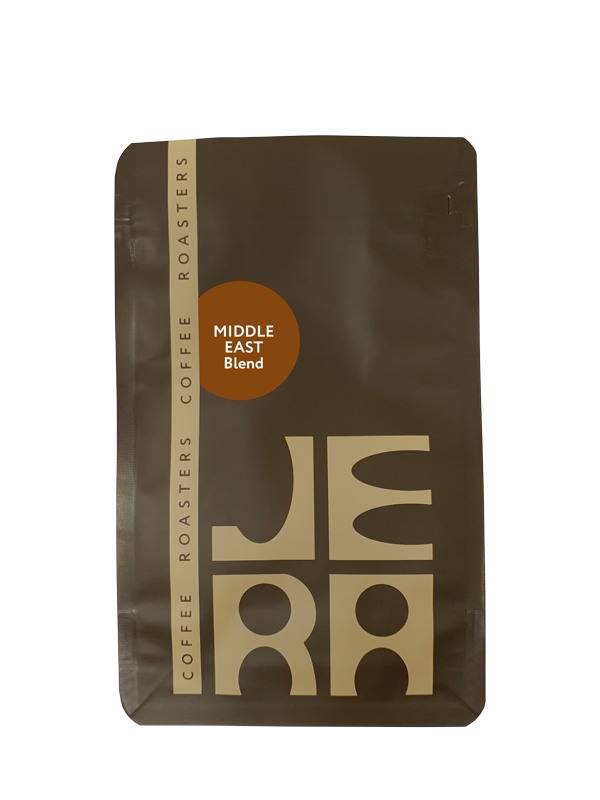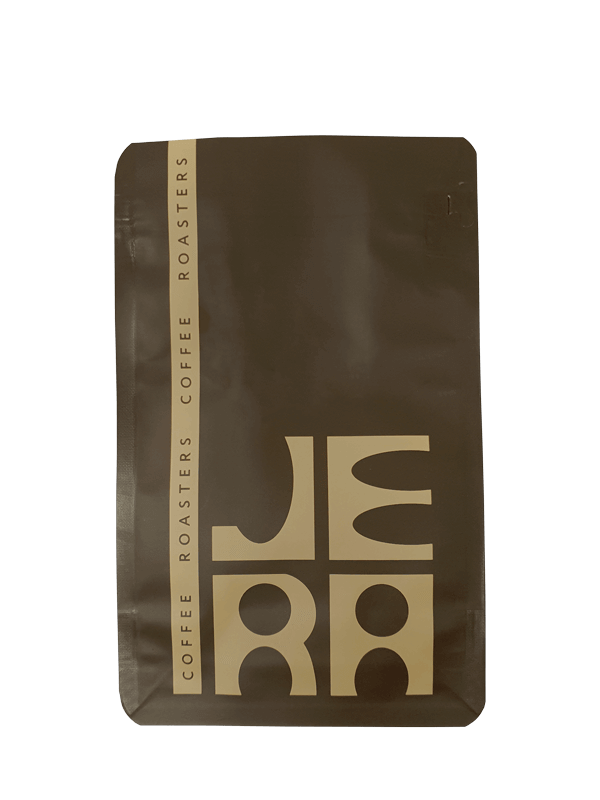פולי קפה אורגני | Colombia, Tolima
פולי קפה אורגני – קולומביה
קפה מאוזן עם גוף כבד, עגול ורך, חמיצות מאוזנת ונעימה. מצוין לאספרסו, קפוצ'ינו, מקינטה או קפה טורקי.
₪45.00 – ₪180.00
ברכישת כל סוגי קפה קלוי בסכום:
בין 600 ש"ח ל-1000 ש"ח עם קוד קופון "15%" תקבלו 15% הנחה
בין 1001 ש"ח ל-1500 ש"ח עם קוד קופון "25%" תקבלו 25% הנחה
מעל 1501 ש"ח עם קוד קופון "30%" תקבלו 30% הנחה
קפה מקולומביה
קולומביה היא מדינה הררית, עם גבהים שמגיעים עד 2,200 מטר מעל פני הים. הקפה גדל במדרונות תלולים, ולכן יש לקטוף אותו כולו ביד. המדינה נמצאת ישירות על קו המשווה, ובשילוב עם טווח הגבהים הרחב שבה, ניתן לקצור קפה כמעט כל השנה. רוב הקפה הקולומביאני מגודל בחוות קטנות שבבעלות חקלאים עצמאיים — גודל ממוצע של חווה הוא רק 3 דונם. רבות מהחוות ממוקמות ביערות הרריים, שם הקפה גדל בצל עצים, והגישה אליהן יכולה להיות קשה מאוד. לעיתים קרובות אי אפשר להגיע אליהן ברכב, ולכן חקלאים רבים משתמשים בסוסים או חמורים — שיכולים לעבור במקומות שרכב אינו מסוגל.
האקלים הלח והטמפרטורות הנמוכות בגבהים הגבוהים גורמים לכך שעיבוד רטוב (washed) הוא השיטה הנפוצה ביותר לעיבוד קפה בקולומביה.
קולומביה היא יצרנית הקפה השלישית בגודלה בעולם. חוות הקפה במדינה ממוקמות באזורים הרריים, בטווח גבהים של בין 1,000 ל-2,300 מטר מעל פני הים. בזכות טווח הגבהים הרחב הזה, קולומביה מציעה מגוון רחב של פרופילים לקפה — מקפה קליל ופרחוני ועד קפה עשיר ושוקולדי.
קפה בעיבוד רטוב
שיטה זו פופולרית במיוחד בקניה, אתיופיה וקולומביה. היא כוללת הסרה מוקדמת של הקליפה החיצונית של דובדבן הקפה במהלך תהליך העיבוד. תסיסה יכולה להתרחש עם או בלי שאריות המעטפת הפנימית (המוך), אך בדרך כלל מסירים את המוך והפולים נשטפים היטב במים כדי להסיר את השכבה הדביקה (mucilage) שנמצאת בין הקליפה הפנימית לקליפה החיצונית של הפרי.
קפה בעיבוד שטוף מתאפיין בחמיצות בולטת, ניחוחות של הדרים ואופי אלגנטי. שיטה זו מניבה תמציות קפה נקיות, חדות ובהירות, שמדגישות את הצלילות והעוצמה של טעמו של הקפה.
פייר טרייד (Fair Trade)
מטרת הסמכה זו היא לתמוך בתנאי עבודה ושכר הוגנים בחוות במדינות מתפתחות. באופן מסוים, היא מקדמת סחר הוגן, ולא מתייחסת רק לקפה אלא גם למוצרים נוספים. ההסמכה פופולרית במיוחד בקרב צרכנים במדינות מפותחות שבהן קיימת מודעות גבוהה יותר לצריכה מוסרית – בעיקר בארצות הברית ובצפון אירופה.
הסמכת Fair Trade מבטיחה שלא נעשה שימוש בעבודת ילדים בחוות, שעובדים מקבלים שכר הוגן, ושמתקיימים תקני בריאות ובטיחות בעבודה. הארגון מבצע בדיקות שוטפות בחוות המאושרות כדי לוודא שהן עומדות בדרישות.
קפה אורגני
קפה אורגני מגודל ללא שימוש בחומרי הדברה, קוטלי עשבים או דשנים סינתטיים — באדמה שטופחה באופן טבעי, ללא חומרים כימיים. לדוגמה, חקלאים עשויים להשתמש בצואת עופות, קליפות קפה, בוקאשי או קומפוסט כדשנים. בנוסף, אם בסמוך מגדלים גידולים אחרים בשיטות שאינן אורגניות, יש צורך באזור חיץ בין השטחים. גישה זו מסייעת להפחתת סחף הקרקע ולשיפור המצב האקולוגי הכללי של האדמה.
למרות שההסמכה האורגנית אינה מסדירה ישירות את תנאי העבודה, לעיתים קרובות נוצר "אפקט משני" חשוב: מאחר שלא נעשה שימוש בחומרים כימיים מזיקים, בריאותם של העובדים נשמרת טוב יותר לעומת סביבות חקלאות קונבנציונליות.
הקפה האורגני תורם בראש ובראשונה לאדמה שבה הוא מגודל — אך בסופו של דבר גם לצרכן, שיודע שהוא שותה קפה שגודל בתנאים מיטביים וללא פגיעה בסביבה.
Coffee from Columbia
Colombia is a mountainous country, with elevations reaching up to 2,200 meters. Coffee grows on steep hillsides, so it must be harvested entirely by hand. The country lies directly on the equator, and combined with its broad altitude range, this allows for nearly year-round harvesting. Most Colombian coffee is grown on small farms owned by independent farmers — the average farm size is only 3 hectares. Many of them are located in mountain forests, where coffee grows in the shade of trees, and accessing these farms can be extremely difficult. Often, it's impossible to reach them by car, so horses or donkeys are commonly used by farmers — they can pass where vehicles cannot.
The country’s humid climate and low temperatures at high altitudes make washed processing the most common method for Colombian coffee.
Colombia is the third largest coffee producer in the world.
Coffee farms in the country are located in mountainous regions, ranging from 1,000 to 2,300 meters above sea level. Due to this wide altitude range, Colombia offers a great diversity of coffee profiles—from light and floral to rich and chocolatey.
Washed Process Coffee
This method is especially popular in Kenya, Ethiopia, and Colombia. It involves removing the outer skin of the coffee cherry early in the process. Fermentation can take place either with or without the pulp, but typically, the pulp is removed, and the beans are thoroughly washed in water to eliminate the sticky mucilage layer that lies between the parchment and the fruit skin.
Washed coffees are known for their pronounced acidity, citrus notes, and elegant character. They produce clean, crisp brews that highlight the coffee's clarity and brightness.
Fair Trade
The goal of this certification is to support fair working conditions and wages on farms in developing countries. In a way, it advocates for fair trade and applies not only to coffee but also to other products. It is especially popular among consumers in developed countries with more conscious consumption habits — mainly in the U.S. and Northern Europe.
Fair Trade certification means that no child labor is used on the plantation, and workers receive fair wages while health and safety standards are maintained. The organization regularly inspects the conditions on certified farms to ensure compliance.
Organic Coffee
Organic coffee is grown without the use of pesticides, herbicides, or synthetic fertilizers — on land that has been naturally cultivated, without chemicals. For example, farmers may use chicken manure, coffee pulp, bokashi, or compost as fertilizers. Additionally, if there is non-organic farming of other crops nearby, a buffer zone is required between the two areas. This approach helps reduce soil erosion and improves the overall ecological health of the land.
While this certification does not directly regulate labor conditions, it often leads to a valuable “side effect”: because no harmful chemicals are used, workers' health is much better protected compared to conventional farming environments.
Organic coffee benefits, first and foremost, the soil in which it is grown. But in the end, it also benefits the consumer — who knows they’re drinking coffee grown under optimal conditions and without causing environmental harm.













